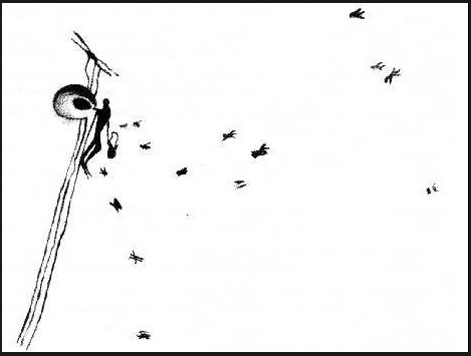YESTERDAY, I was out in the forest looking for the endangered 'ahi (sandalwood) tree to collect their ripening purple seeds, when I heard an intense buzzing overhead. Freezing in my tracks, I looked up and saw this:

Notice the hundreds of small black dots. They are BEES! There was a great swarm of honey bees and I crept closer to get a photo, risking life and limb for a good shot, which was hard to get with my little zoom lens, but the actual honeycomb is inside this tree hollow, as you can see:
After a few shots, it dawned on me that bees are known to bite. And so I retreated and went to take photos of the Warrior's Sia, an archeological site in the forest which we're restoring (I'll blog about this later). I was gone for about fifteen minutes, and when I returned the swarm of bees had vanished! There were still bees doing their thing in the hollow of the tree, but where had the mass of buzzing bees hived off to? I can only wonder, and now I'm kicking myself for not being patient and observing more carefully where they went, because I have been observing the hive there at 'Honeycomb Hideout' because I want figure out how to domesticate these bees and have our own apiary - part of the move towards finding sustainable sources of sugar (as an aside, right now a kilo of raw sugar costs us over TP$3).
Honey bees have been domesticated by humans for thousands of years. Ancient cave drawing depicting perilous bee hunters adorn rock walls in Spain:
 | |||||||
| "Estimates of age place the rock painting depicted above at approximately 15,000 years old. Discovered in the early 1900's in Valencia , Spain in the Cave of the Spider (Cueve de la Arana) situated on the river Cazunta, the painting speaks of man's long fascination with honey." - http://www.mdbee.com/articles/cavepainting.html |
Ancient Egyptians revered honey as well, one of the names for Pharaoh was Bee King.
And apparently, Ambrosia, the drink of choice amongst the Greek Gods and Goddesses in Olympia, was a concoction made of....you guessed it: honey.
 |
| Pic from ourpoliticsblog.com |

